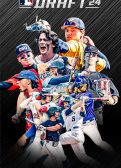NEW: Top 100 Draft prospects for '24
Teams looking for high-end talent in the 2024 Draft are going to have to go back to college.
That’s especially true of those teams picking at the top of the first round. MLB Pipeline’s new 2024 Draft Top 100 is extremely college-heavy at the top, with only one high schooler cracking the top 10. There are only four prepsters in the top 20, well below the average (9.2) since MLB.com started ranking Draft prospects.
• 2024 Draft | Order
Here’s the Top 10:
1. JJ Wetherholt, 2B/SS, West Virginia
2. Nick Kurtz, 1B, Wake Forest
3. Travis Bazzana, 2B, Oregon State
4. Charlie Condon, OF/1B, Georgia
5. Jac Caglianone, 1B/LHP, Florida
6. Vance Honeycutt, OF, North Carolina
7. Tommy White, 3B, Louisiana State
8. Konnor Griffin, OF, Jackson Prep (Florence, Miss.)
9. Seaver King, OF/SS, Wake Forest
10. Braden Montgomery, OF/RHP, Texas A&M
Complete list »
This isn’t so dissimilar to last year’s Top 100, which featured eight college guys in the top 10. That list, however, had three advanced arms on it. It might be an unfair comparison, as the top five selections from 2023 may end up being one of the best quintets in Draft history, though this year’s top has a pretty good collective hitting resume.
Teams that like advanced bats certainly have some options. It starts with West Virginia infielder JJ Wetherholt, who led NCAA Division I baseball with his .449 average a year ago. He’s the best pure hitter in the class, getting a 70 hit grade, and he has plenty of impact and can run (36 steals). Wetherholt will be playing shortstop for the Mountaineers this spring, but even those who think he’s destined for second base think his bat is enough to warrant consideration.
Nick Kurtz’s hit tool isn’t that far behind Wetherholt’s, and the Wake Forest product has prodigious power to go along with it. He is a first baseman only, albeit a good one, which does limit his profile a little. The same is true for Oregon State’s Travis Bazzana, who might have more power than Wetherholt but grades out lower as a pure hitter and is a second baseman only.
The next four are all college hitters as well, with a wrinkle. Georgia’s Charlie Condon is No. 4, Florida’s Jac Caglianone is fifth, Vance Honeycutt from North Carolina is No. 6 and LSU’s Tommy White is No. 7. Caglianone is a true two-way player, and while the industry seems to be leaning towards him being a slugging first baseman, it’s too soon to discount the fact that he’s a left-hander with a 70-grade fastball on the mound.
“It’s hard to find who is the top position guy is in the class,” an American League scouting director said. “There are a lot of second basemen and first basemen we think can hit, but if you’re picking in the top 10, you’d rather be shooting for someone at a premium position with a more well-rounded set of tools and ceiling. You want impact in the top 10. Those position plays that are second and first basemen, the bar is so much higher to clear to be an impact big leaguer.”
“So far the strengths are the college bats,” an NL scouting director said. “We’re still waiting for other guys to emerge from the other groups of players. It’s a little bit cloudier because there isn’t that center fielder, shortstop or catcher. That guy hasn’t emerged.”
Konnor Griffin has perhaps the best all-around toolset in the class (he’s pretty good on the mound, too), and that’s why he’s the lone high schooler to crack the top 10. PJ Morlando, an outfielder from Summerville (S.C) HS, lefty Cam Caminiti from Saguaro High in Scottsdale, Ariz., and outfielder Slade Caldwell, who plays at Valley View HS in Jonesboro, Ark., are the only other prep players in the top 20.
High school pitching is always mercurial, and while it’s often difficult to put too many high up on a list -- last year, Noble Meyer was the only prep pitcher to come close to the top 10 (he was No. 16 at this point a year ago) -- this year is even tougher to project. After Caminiti, the next-highest-ranked high school arm is Ryan Sloan from York HS in Elmhurst, Ill., at No. 30. After that, though, there is a group of intriguing prep pitchers with some upside, so there could be some value to be had as the Draft leaves the first round, with the possibility that some of these young hurlers will work their way into opening-round consideration.
“We’re optimistic there will be a few high school arms that are available,” the AL scouting director said. “I think you’ll see more jockeying. There will be pitchers who perform and some that fall to the wayside. You always go into the spring optimistic, wanting to like players. You’re at the mercy of the class doing that. I think there are options if you go there. It’s more of a wait-and-see approach than normal and see if they’ve taken the next step in their development.”
“There’s no Andrew Painter or Noble Meyer at this point, but I do think there’s a lot of depth,” the NL scouting director said. “Once you get out of the first round, or back end of the first round, you’re going to start to see some of those guys get talked about. “
One other wait-and-see category might be the two-way player. There have always been players who both pitch and play a position, especially in high school, with some good enough to continue to do it in college, but it typically is clear by now which direction a pro career should head in. This year’s class, starting with Caglianone in the top five, has what seems to be an unusual amount of players where the jury might still be out as to what might work in the pro game. Noah Franco at IMG Academy in Bradenton, Fla., and Bryce Rainer at Harvard-Westlake School in Los Angeles are two high schoolers in the top 40 with potential on both sides, while Texas A&M’s Braden Montgomery and Oklahoma State’s Carson Benge join Caglianone as collegians with two sets of grades.
“It's certainly become a trend,” the AL scouting director said. “You’re seeing more guys who are good at both. We’ve found that most of those two-way players don’t want to give up the bat until they have to. They want to pursue both, even if we think they’re better on the pitching side, they want to extend hitting for as long as they can.
“You watch them do both things in the spring and you decide internally what you think is their best path, and you hope it aligns with what they want, especially with the high schoolers. They’re skilled at both things, which is impressive on its own.”

